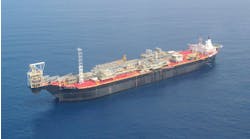Simon Curtis, Curtis Davis Garrard LLP
The majority of FPSOs operating worldwide are leased from specialist contractors under Production Services Agreements (PSAs). Under such contracts, the contractor owns and manages the FPSO, providing a range of services required by the operator, including receiving, processing, and storing the crude oil before it is offloaded to a shuttle tanker.
From the operator’s perspective, the success of an FPSO project normally is judged by the extent to which the production unit achieves the required level of field production. The operator will want to be protected against the possibility of paying for the FPSO when it is not performing, and to provide a financial incentive for the contractor to rectify problems which are preventing performance.
The contractor’s perspective will be different. The company usually will have incurred substantial capital expenditure in building, converting, and installing the FPSO – the priority will be to ensure that these costs are amortized over the project life through payment of the capex element of the day rate.
Additionally, the contractor will wish to ensure that receipt of the balance of the contractual remuneration is not unduly affected by variations in the FPSO’s operating performance. Because the contractor typically is rewarded on a fixed-rate basis and entitled to none of the ‘upside’ benefit if the field is more productive than originally anticipated, it is not unreasonable to argue that his ‘downside’ exposure should be limited.
The usual course is, therefore, to agree that the contractor will be penalized for non- or under-performance by way of reductions – in some circumstances to zero – in the contractual day rate payments due under the PSA. However, the mechanisms used often are complicated by the multiplicity of potential causes of failure in performance, and various components that typically determine these day rates, including capex, daily operating costs, and ‘special’ payments for additional services such as water and gas injection.
Given the potential for losses where field production is disrupted, it is neverthless commonplace for the contractor to insist that such reductions in day rate remuneration should represent only liability for performance failures and/or that in no circumstances the contractor should be liable in damages for the operator’s ‘consequential’ losses, including loss of field production.
Production issues
The ability of an FPSO to meet its performance targets is influenced by various factors, including the productivity of the field reservoir, the characteristics of the crude oil to be processed, and the metocean conditions at the FPSO.
The specifications attached to the PSA normally define a range of operating criteria for the FPSO, and the PSA itself will stipulate that the contractor (i) assumes no ‘reservoir risk’ and (ii) will not be penalized for performance ‘failures’ where such criteria are not met – i.e., the operator bears such risks. However, where relevant operating criteria have not been defined and do affect the FPSO’s operation, it is often the contractor who assumes the risk in terms of a reduced or zero day rate.
A second important factor in securing FPSO performance is likely to be the political environment in which the FPSO is required to operate – the FPSO will require a range of permissions from national and/or local governments controlling the field and is even likely to depend highly upon shore-based supply and other support which can be prejudiced seriously by strikes and other adverse local circumstances.
In most FPSO projects, the operator, rather than the contractor, will assume these ‘political’ risks. The contractor normally will wish, for instance, to be fully protected against the consequences of a change in the applicable tax regime under which the company will operate the FPSO. This is especially the case where the relevant regime requires the operator to pay day rates net of ‘withholding’ or other taxes levied directly on the contractor’s income stream.
Perhaps the most significant cause of FPSO performance failures, however, is the incidence of defects and breakdowns in specific items of machinery and equipment; these may affect the processing performance of the unit or its station-keeping or offloading capabilities.
Where the failure leads to a complete shutdown of production or the withdrawal of other essential services, then (subject to any agreed ‘maintenance allowance’) the contractor normally suffers a significant reduction, often to zero, in the contractual day rates payable.
However, the real difficulty in this context lies in determining the financial consequences ofpartial non-performance by reason of equipment failure i.e. where the FPSO is operational but performing at less than its expected capabilities for reasons originating within the unit itself.
Given the range of potential factors which can affect compliance, some FPSO contractors traditionally refuse to operate on a ‘performance’ basis, seeking instead to insist on ‘availability’ as the only criterion for determining their day rate entitlement. In this case, provided there is no breakdown of equipment on board the FPSO leading to an instruction to choke back production from the wellheads, the contractor should earn his operating day rate regardless of the performance of the FPSO in terms of generating processed crude oil.
There should be no need, therefore, to consider whether any shortfall from expected production levels has resulted from deficiencies of the FPSO itself or from other causes such as declining reservoir production or the characteristics of the received crude.
However, many contractors are finding this approach difficult to sustain as operators insist on a ‘payment for results’ approach to FPSO contracting and demand proportionate reductions in day rate payments where performance targets are not met. In such circumstances, it is plainly vital from the contractor’s perspective that the targets are defined clearly, take into account relevant variable factors (in particular the declining production profile of the field), and incorporate a range of exceptions to protect the contractor from the possibility of day rate reductions for circumstances which are not the company’s ‘fault’ in the sense that they are outside the scope of the contractor’s control or influence.


